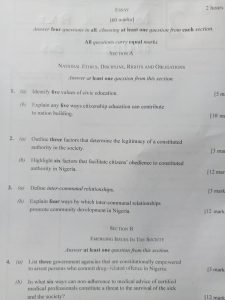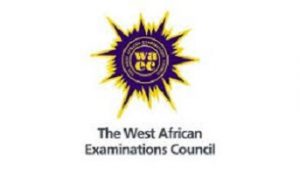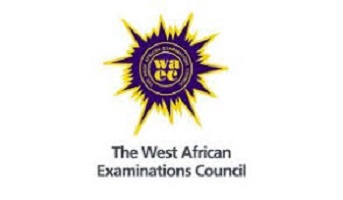Table of Contents
Waec Civic Education question and answers 2023
Here is the Waec Civic Education question and answers 2023


Answers
CIVIC EDUCATION
01-10: ACCABBDDCD
11-20: CADBADABCD
21-30: DADADCCADB
31-40: AADDACCDBB
41-50: BBCBBBDBAD
*COMPLETED*
1. :
(i) Responsibility: Civic education instills responsibility in citizens to participate actively in the development and governance of their society and to uphold ethical and moral principles.
(ii) Respect for diversity: Civic education promotes respect for diversity in terms of culture, religion, ethnicity, gender, and socio-economic status.
(iii) Patriotism: Civic education fosters patriotism by instilling a sense of loyalty and commitment to one’s country.
(iv) Critical thinking: Civic education imparts critical thinking skills to citizens, enabling them to make informed decisions, evaluate information, and engage in constructive dialogue.
(v) Social justice: Civic education promotes social justice by emphasizing the need for fair and equal treatment of all members of society.
(b) Citizenship education can contribute to nation building in the following ways:
(i) Increased civic participation: Civic education encourages citizens to participate in decision-making processes and engage in activities that promote social cohesion.
(ii) Effective governance: Citizenship education can develop citizens’ knowledge and skills to participate in governance and hold leaders accountable.
(iii) Promotion of social harmony: Citizenship education can promote social harmony by emphasizing shared values, respect for diversity, and peaceful conflict resolution.
(iv) Economic growth: Citizenship education can develop citizens’ entrepreneurial skills and knowledge, which are key drivers of economic growth.
(v) Active citizenship: Citizenship education can create opportunities for citizens to take active roles in their communities, leading to positive change.
2. (a)
:
(i) Constitutional authority: The extent to which the authority is based on the constitution of the country.
(ii) Democratic legitimacy: The extent to which the authority is elected or appointed through a democratic process.
(iii) Moral legitimacy: The extent to which the authority is supported by societal values and moral principles.
(b) Six factors that facilitate citizens’ obedience to constituted authority in Nigeria include:
(i) Socialization: Citizens are socialized to obey constituted authority through family, religion, and education.
(ii) Fear of punishment: Citizens obey constituted authority to avoid punishment or sanctions.
(iii) Legitimacy: Citizens obey constituted authority when they perceive it to be legitimate and fair.
(iv) Trust: Citizens obey constituted authority when they trust it to act in their best interests and to uphold the rule of law.
(v) Rewards: Citizens may obey constituted authority when they receive rewards, such as access to services or economic opportunities.
(vi) Coercion: Citizens may be coerced to obey constituted authority through the use of force or threats.
3. (a) Inter-communal relationships refer to the interactions between communities and groups of people from different ethnic, religious, or cultural backgrounds.
(b) :
(i) Promotion of social harmony: Inter-communal relationships encourage dialogue, understanding, and cooperation between different groups, leading to social harmony and peaceful coexistence.
(ii) Improved access to resources: Collaboration between communities can increase access to resources, such as education, health care, and infrastructure.
(iii) Economic growth: Inter-communal relationships can foster economic growth by enabling the exchange of goods and services between communities and promoting investment.
(iv) Conflict resolution: Inter-communal relationships can facilitate peaceful conflict resolution by promoting dialogue, negotiation, and compromise.
(7)
{PICK ANY FIVE}
(i) Public Participation and Citizen Engagement: Public service fosters citizen engagement and participation in decision-making processes. It involves promoting transparency, accountability, and citizen involvement in policy formulation, planning, and evaluation. This helps ensure that public services are responsive to citizens’ needs and priorities.
(ii)Social Welfare and Poverty Alleviation: Public service in Nigeria aims to address social challenges, reduce poverty, and enhance social welfare. This includes the implementation of programs related to healthcare, education, housing, social protection, and empowerment initiatives to uplift marginalized communities.
(iii) Public Infrastructure Development: Public service is responsible for planning, designing, constructing, and maintaining public infrastructure such as roads, bridges, water supply systems, electricity grids, and public buildings. These infrastructural projects are crucial for sustainable development and improving citizens’ quality of life.
(iv) Economic Development: Public service contributes to economic development through policies and programs that promote investment, job creation, trade, and economic growth. This involves formulating and implementing economic policies, fostering an enabling business environment, and attracting investments.
(v) Law Enforcement and Justice: Public service plays a vital role in maintaining law and order. This includes law enforcement agencies, the judiciary, and other legal institutions responsible for upholding the rule of law, ensuring justice, and protecting citizens’ rights.
(vi) Governance and Administration: Public service facilitates the smooth functioning of government institutions by managing administrative processes, including budgeting, procurement, human resources management, and public financial management. This helps maintain transparency, accountability, and good governance.
(vii) Service Delivery: One of the primary functions of public service is to provide essential services to the public, such as healthcare, education, infrastructure development, security, and social welfare programs. Public servants work to ensure the efficient and equitable delivery of these services.
(viii) Policy Formulation and Implementation: Public service plays a crucial role in formulating policies and implementing them effectively. This involves developing strategies, laws, regulations, and programs to address societal needs and promote development.
*CIVIC EDUCATION NUMBER 6????????*
6(a) Six consequences of cultism in society are:
1. Violence and Crime: Cultism is often associated with violence, intimidation, and criminal activities. Cult groups engage in various forms of violence, including physical assault, extortion, kidnapping, and even murder. This not only poses a threat to the safety and security of individuals but also disrupts societal harmony.
2. Social Disruption: Cultism can disrupt social order and cohesion within communities. It creates fear and tension among residents, leading to a breakdown of trust and cooperation. Cult activities can also disrupt academic environments, as they often target schools and campuses.
3. Loss of Lives and Potential: Cult-related violence and conflicts result in the loss of lives and potential. Young people who become involved in cultism may lose their lives prematurely or face imprisonment, denying them the opportunity to contribute positively to society.
4. Drug Abuse and Addiction: Cult groups are known to engage in drug abuse and trafficking. The lure of power and protection associated with cultism often leads members to indulge in substance abuse. This not only poses health risks to individuals but also fuels the drug trade, contributing to societal problems.
5. Recruitment of Youth: Cult groups often target vulnerable youth who may be seeking a sense of belonging, protection, or social identity. The recruitment of young people into cults can disrupt their education, values, and aspirations, trapping them in a cycle of violence and criminal activities.
6. Economic Implications: Cult activities can have negative economic consequences for communities. Businesses may suffer due to extortion and intimidation by cult members, and investment and development projects may be discouraged in areas where cultism is prevalent.
(3a) Inter-communal relationships refer to the interactions, connections, and bonds between different communities or ethnic groups within a specific geographical area. It involves the social, cultural, economic, and political interactions that occur among individuals, families, organizations, and institutions from different communities.
(3b) Inter-communal relationships promote community development in Nigeria in several ways:
i. Cultural Exchange and Diversity: Inter-communal relationships provide opportunities for cultural exchange and appreciation. When different communities interact, they share their customs, traditions, languages, arts, and values. This exchange of cultural knowledge and experiences enriches the diversity of Nigerian communities and promotes mutual understanding and tolerance.
ii. Peace and Conflict Resolution: Effective inter-communal relationships contribute to peaceful coexistence and conflict resolution. When communities establish open lines of communication and engage in dialogue, it becomes easier to address misunderstandings, resolve disputes, and prevent conflicts from escalating. Promoting peaceful interactions helps to maintain stability and fosters an environment conducive to development.
iii. Economic Collaboration: Inter-communal relationships can enhance economic development in Nigeria. Communities that collaborate and engage in trade, business partnerships, and resource sharing create economic opportunities and increase productivity. Cooperation among communities can lead to the development of industries, infrastructure, and markets, thereby boosting local economies and improving the living standards of the people.
iv. Social Integration and Unity: Inter-communal relationships foster social integration and unity among diverse groups. When different communities interact positively, stereotypes and prejudices can be challenged and overcome. By promoting inclusivity and a sense of belonging, inter-communal relationships create a unified society where people work together towards common goals, such as education, healthcare, and community development projects.
v. Political Engagement and Representation: Strong inter-communal relationships encourage active political engagement and representation. When communities collaborate, they can collectively advocate for their needs, interests, and rights. This inclusivity helps to ensure that diverse voices are heard in the decision-making processes at various levels of government. It promotes equitable distribution of resources, social justice, and good governance.
*CIVIC EDUCATION NUMBER 5????????*
5(a) Three major ways by which HIV/AIDS can be contracted are:
1. Sexual Transmission: HIV can be transmitted through unprotected sexual intercourse with an infected person. This includes vaginal, anal, and oral sex. The virus can enter the body through cuts or sores in the genital area, as well as through mucous membranes in the rectum, vagina, penis, and mouth.
2. Blood Contact: HIV can be contracted through direct contact with infected blood. This can occur through sharing needles or syringes contaminated with HIV-infected blood, such as in intravenous drug use. It can also happen through blood transfusions with infected blood (though this is rare in countries with effective blood screening programs).
3. Mother-to-Child Transmission: HIV can be transmitted from an infected mother to her child during pregnancy, childbirth, or breastfeeding. This is called vertical transmission. However, the risk of transmission can be significantly reduced with appropriate medical interventions, such as antiretroviral therapy (ART) for the mother and certain precautions during childbirth.
(5b) Three reasons why the eradication of HIV/AIDS is still problematic in Nigeria are:
1. Stigma and Discrimination: HIV/AIDS is still associated with stigma and discrimination in many societies, including Nigeria. This stigma can prevent people from seeking testing, treatment, and support services, leading to a further spread of the virus.
2. Limited Access to Healthcare and Resources: Many parts of Nigeria, especially rural areas, face challenges in terms of healthcare infrastructure, resources, and access to HIV prevention and treatment services.
3. Socioeconomic Factors: Poverty, illiteracy, and gender inequality contribute to the persistence of HIV/AIDS in Nigeria. These factors can limit access to education and awareness about HIV prevention, as well as hinder economic opportunities and healthcare access, particularly for vulnerable populations.
*ANOTHER NUMBER 6*
*CIVIC EDUCATION*
(6a)
(PICK ANY SIX)
(i)Violence and Criminal Activities: Cultism often involves the use of violence, intimidation, and criminal activities such as robbery, kidnapping, drug trafficking, and extortion.
(ii)Loss of Lives and Property: Cult clashes and rivalries can result in frequent clashes between different cult groups, leading to loss of lives and destruction of property.
(iii)Breakdown of Law and Order: Cultism undermines the rule of law by creating a parallel system of authority and justice.
(iv)Social Instability: Cult activities can disrupt social harmony and stability within communities.
(v)Cult Recruitment and Exploitation: Cults often employ deceptive tactics to recruit vulnerable individuals, particularly young people.
(vi)Erosion of Ethical Values: Cults often promote ideologies that contradict societal norms and ethical values.
(vii)Academic Disruption: Cultism frequently infiltrates educational institutions, leading to the disruption of academic activities.
(6b)
(PICK ANY THREE)
(i)High levels of poverty, unemployment, and inequality create an environment where vulnerable individuals are more likely to be recruited into cults.
(ii)Inadequate resources, corruption, and a lack of proper training and coordination among law enforcement agencies can hamper their ability to effectively combat cult activities.
(iii)One significant hindrance to eradicating cultism in Nigeria is the lack of effective law enforcement.
(iv)Limited public awareness and understanding of the dangers and consequences of cultism can hinder eradication efforts.
(v)Cults employ sophisticated techniques of manipulation and indoctrination to control their members’ thoughts, beliefs, and actions
*9a)* The Executive arm of government: This arm of government is concerned primarily with the administration of the state. It ensures that the laws made by the legislature are properly executed by its members. The executive arm is headed by the President of the state. It is made up of the Police, Arm Forces and different ministries and parastatals. This arm wields the greatest power within the government because of the role it plays in governance.
The head of this arm is usually elected by the electorates. When the head gets into power, it makes appointments for the different ministries and parastatals and build a cabinet. The President is the head of the Armed Forces. This arm of government carries on ceremonial functions as well in representation of the state.


